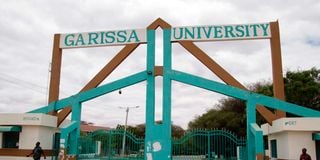Premium
Garissa University terror attack: Court cuts jail term for 2 convicts

Garissa University's main entrance as pictured on March 13, 2023.
The High Court in Nairobi has reduced the jail term for two men convicted for the 2015 Garissa University terror attack from 41 years to 25 and a half.
Justice Cecilia Githua further quashed and set aside a magistrate’s decision to sentence Hassan Eddin Hassan and Mohammed Abdi Abikar to 15-and a half years in jail for the offence of being members of terror group al-shabaab.
The judge said the prosecution did not present proof that the two were members of the terror group.
“I find that it was not disputed that this group exists and is a terrorist organisation. Although the same is listed as a terrorist group in 2010 and 2015 Kenya Gazette notices, my perusal of the only evidence adduced by the prosecution on these two counts was a claim by Pw7 (a witness), that during the attack, one of the terrorists declared that they were members of al-shabaab and the objective was to compel the government to remove its defence forces from Somalia,” said Justice Githua.
“Pw7 did not say the terrorist who made this declaration was the first or second appellant (Hassan Eddin Hassan or Mohammed Abdi Abikar). In any event, the two appellants were not physically present at the school during the attack,” stated the judge.
She added that the pair was wrongly convicted in the accusation of being members of the Somalia-based terror group, who planned and executed the bloody attack on Garissa University.
The two were jailed in July 2019 for assisting al-shabaab fighters who attacked the university and killed 148 students and staff on April 2, 2015.
Evidence showed the convicts were in telephone communication with terrorists killed by Kenya security forces during the attack, the court said.
Quashing their sentencing for being members of the terror group, the judge found that the prosecution did not adduce any evidence to show or prove how the appellants were members of al-shabaab.
“There was no confession by any of them to being a member of the group or [to being] found with documents or articles for the group. The prosecution did not make efforts to establish any nexus between the appellants and the al-shabaab," the judge said.
“The appellants denied the offence and it was the duty of the prosecution to prove the charges, as preferred, beyond any reasonable doubt. Appellants did not have an obligation to prove their innocence.”
The convicts were following the court proceedings by video-conference from Kamiti Maximum Security Prison.
Although from the evidence was a strong suspicion that the two convicts were al-shabaab members, the judge ruled that suspicion, however strong, cannot be proof.
In her judgement, Justice Githua dismissed the convicts' appeals against conviction and sentencing for the offences of conspiracy to commit a terrorist act and committing a terrorist act.
For the two offencesm they were sentenced to 10 and half years, and 25 and half years in prison, respectively. The sentences will run concurrently.
Justice Githua further rejected the convicts' claim in the appeal that the two sentences were harsh and excessive.
“The magistrate considered all submissions, the nature of the offence, circumstances underwhich it was committed and pleas in mitigation made by appellants, including the fact that they were youthful first offenders,” said the judge.
“I find they were convicted of monstrous terrorism offences which led to the loss of the lives of many innocent Kenyans, including vulnerable and defenceless students who had nothing to do with making the government remove the Kenya Defence Forces from Somalia,” said Justice Githua.
According to the judge, the convicts’ actions and those of their colleagues “were cowardly premeditated acts that caused trauma to victims and their families and will continue to traumatise them for the rest of their lives”.
“It must also be remembered that terrorism is a grave and heinous transnational crime that not only has devastating results to victims but also poses a serious threat to both national and global security,” said justice Githua.




